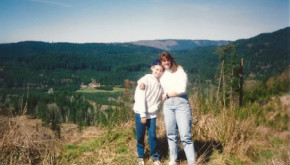
Back in May 2012, I was asked by Nicole Strong to write about my personal involvement in the family timber property that had been in our family since the 1950’s.
I had met Nicole as part of the Women Owning Woodlands, Oregon Small Woodlands Association (OSWA), and Master Woodland Manager groups several years before. And, while it is 2016, and I have been out of the industry for several years, I promised her that I would write this when I knew the “end of my story”. I apologize for the delay, but this has been a lengthy and somewhat sad story. I can only hope that those of you involved in a “family business” surrounding your own timber property, can learn from what happened to our family.
~ Marti Willis
.......
My grandfather purchased 240 acres outside of Coquille for a mere $15,000 back in 1951. His reason for purchasing it at that time was to “protect” the illegal still that his brother-in-law maintained up on Cherry Creek. My grandmother’s family had been in the area for years, and her family plot takes up a good chunk of what is still the Dora Cemetery. There is a considerable amount of family history here.
My father Robert Nielsen, upon hitting a crossroads in his life, began managing it in the late 70’s after realizing it’s potential as a managed tree farm. He had been raised in a farm family and always had a love for the land. He also saw it’s financial value, if indeed it was managed properly. The property was to be willed to he and his brother upon the death of my grandparents.
He took the Master Woodland Manager class and became very involved in the timber industry in Oregon, becoming a member of OSWA as well. His intent and vision, was to manage the property in such a way that it would benefit our family for generations to come. Both financially and with it’s historical legacy.
This property was beautiful, gorgeous, and breathtaking. Peace and serenity fell upon all those that trekked up the mountain. I fell in love with it the very first time I ever saw it back in my 20’s. Over the course of time, I visited the property numerous times with my father. After a very dysfunctional relationship with him in my younger years, due to his alcoholism and the divorce that tore my family apart, I was very thankful that it brought us closer together again. We had that shared interest in the love for the land and the trees.
When I was in my early 30’s, my father (mid 60’s) had the foresight to ask me if I would be interested in “taking over” from him when he could no longer physically, and or mentally manage the property. This was at a time when no one gave a thought to the planning involved in order for the next generation to take it over. Something that is highly taken into consideration now.
He knew of my love for the land and how much it meant to me. He knew that I would do everything I could to keep it in the family. I could learn the ropes from him, take the Master Woodland Manager class, and meet those that I would be involved with along the way. I eagerly said “yes” and became entrenched in learning the industry over the next 12 years, with him as my mentor. While he promised me a future both financially and emotionally in managing the timber, until I passed it on to yet another generation, my biggest mistake, looking back in time, was that I did not set up a legal agreement between the two of us. It was instead, a verbal agreement based on trust and integrity.
I slowly gained my fathers confidence and he slowly relinquished his duties over the following years. It was obvious however, that the new technology and my way of doing things in “modern times” did not always agree with his way of thinking. As the years progressed, I realized as well that he was threatened by a “woman” taking over. That he did not think that a woman could do it as well as a man in this industry. It was all a constant struggle.
Then, because of an auto accident in 2001, the early stages of dementia, and a severe case of Macular Degeneration at the age of 82, his attitude took a downward spiral. While my father had not been severely hurt in the accident, my stepmother, who had been his voice of reason and my ally for 20 years, was critically hurt and would never recuperate to the point of having that positive mental impact on him that she had once had.
The anger and frustration generated by his physical and mental limitations caused a general distrust in people. His judgment became impaired and while he felt that he could still make appropriate decisions that impacted the land, harvesting, and my management, his decisions began to impact the overall management of the property and thus, his estate plan in a negative manner.
While I tried my best to proceed with the management plan that we had in place, his condition made it exceedingly difficult. He could not distinguish between our personal and business relationships, and became increasingly critical of anything I attempted to achieve. Everything that we had worked towards, including our relationship and our management plan, began to unravel. In the years before his death, I was limited in my efforts, but continued to have a positive outlook towards what I might be able to achieve in the future. To further everything that we had planned.
During his life, my father had paid very close attention to his trust and the guidelines provided by that trust. His stated intent was to provide for the monetary needs of my stepmother’s care during her lifetime, to have all the family land go to his children, and anything left over would then go to charity. (Including a very large sum to OSU) It was critical that the land remain in the family.
He and my stepmother were in total agreement of how their trusts should be handled and kept their estates separate. She had 4 children of her own who would benefit not only from her trust, but a substantially large one of their father’s. She did not need my fathers estate money, but knew it was there to care for her needs during the remainder of her life. We had a very caring and loving relationship with her and she had stood up for us over the years, encouraging my father to do what was right by us and our inheritance. And while he had changed his trust many times during the last few years, the basics never changed.
In fact, in his last trust revision, he provided the funds to purchase my uncle’s half of the timber and added funds for a college education for my nephew. We only found out about these latest additions upon his death. As, during his last few years, he found it necessary to keep everything “hidden” from us.
Unbeknownst to us, the “second side” of the family (my stepmothers’ children) took advantage of my father’s insistence in distancing himself from his own children during his last few years. That combined with their mother’s limited cognitive abilities and my fathers’ dementia enabled them to gain control of what was to be the “final chapter”.
With my step sister as my step mother’s executor, and her husband (a former attorney) as my fathers executor, it developed into the perfect storm. This, combined with an attorney that represented both trusts, they manipulated the situation for the best possible outcome on their part. Knowing my father had limited time, they waited for his death and then immediately took my step mother in to sign what was listed in my father’s trust as a “General power of appointment”. Something we were aware of, but understood that it had to do with taxes and could only be signed by my step mother being of sound mind. While it was clear over the months that followed (she died 9 months later), that she had no idea of what she had signed, it was too late and the bulk of my father’s trust had transferred into my step mother’s estate. We were not made aware of this until after she died. We were mislead into believing that once she passed, then my father’s trust would be executed as per his wishes. We were lied to by everyone during the 9 months between their deaths. My step siblings inherited everything in my father’s trust, except the land.
Since the land was in a bypass trust, we were able to hang onto that, but we no longer had the funds to buy our uncle out and retain the entire property for future generations. Because of this, and my uncle’s failing health (he died this past year) and his insistence that we sell it, we could not hang on to the property. My fathers wishes and my future involvement in the property vanished. We have since been told that this “General Power of appointment” is something that they no longer add to Revocable Living Trusts. That it was an old carry over from my father’s original trust and should have been removed long before.
While OSU sued, they could not prove beyond the shadow of a doubt that my step mother did not know what she had signed. They received a small settlement, but nothing like what was intended. Along with us, several other charities did not get what was allocated to them as well.
In conclusion, I highly suggest that every family take precautions to make sure that this does not happen to them. Make sure you have a PLAN! Make sure that the elder family members engage a reputable estate attorney while they are of sound mind. That they have someone trustworthy as their representative and or executor. If this is a family member, to make sure that all other family members are in agreement of this person. If not, assign someone outside the family that has no personal reward of the outcome. Have the parents or grandparents share their wishes with their children if applicable. Engage in legal contracts surrounding the management, whether these are with the family members or outside personnel. Make sure that everyone involved is on the same page (all family members).
Also take into considerations that elder family members become scared when faced with life’s tough choices surrounding health. When health changes, they may become scared and frightened and even threatened by those that are only trying to help them. They may not want to talk about this, they may not know what is best for them. Above all else, communicate.
I realize that every situation is different, and mine certainly was. But take the lessons learned and apply them according to your own situation.
Make this the best experience for your family. Simply take the time to do it right. It is a lifetime investment, one which can provide so much to all involved. It can bring a family closer together. It can also tear them apart.

